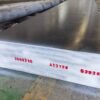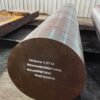DIN1.2311/P20 Plastic Mould Steel Steel Product Overview
DIN1.2311/P20, also known as AISI P20, is a versatile, low-Plastic mould steel under the DIN EN ISO 4957 standard, widely used for plastic mould applications. This chromium-manganese-molybdenum steel is characterised by excellent machinability, good polishability, and uniform hardness, typically supplied in a pre-hardened condition (280–325 HB). It offers a balance of toughness, wear resistance, and dimensional stability, making it ideal for large plastic moulds and low-melting-point die-casting applications. Its composition ensures good corrosion resistance and suitability for texturing and photo-etching.
Applications
DIN1.2311/P20 is primarily used in plastic mould manufacturing and related applications:
Plastic Moulds:
- Large injection and compression moulds for the automotive, appliance, and consumer goods industries.
- Moulds for plastic products like bumpers, dashboards, and packaging components.
- Blow moulds and structural foam moulds.
Die Casting:
- Low-melting-point metal die casting (e.g., zinc and aluminium alloys).
- Die holders and bolsters for die-casting tools.
Other Uses:
- Extrusion dies for plastics and rubber.
- Tooling for slush moulding and low-pressure moulding.
- Jigs, fixtures, and machine components requiring high polishability.
Chemical Composition
The chemical composition of DIN 1.2311/P20 provides its machinability, toughness, and polishability:
| Element | C | Si | Mn | P | S | Cr | Mo |
|---|---|---|---|---|---|---|---|
| Content | 0.28–0.40 | 0.20–0.80 | 0.60–1.00 | ≤0.030 | ≤0.030 | 1.40–2.00 | 0.30–0.55 |
- Chromium (Cr): Enhances hardness, wear resistance, and corrosion resistance.
- Molybdenum (Mo): Improves strength and resistance to tempering.
- Manganese (Mn): Contributes to hardenability and toughness.
- Carbon (C): Provides hardness while maintaining machinability.
Supply Size
DIN1.2311/P20 is available in various forms and sizes to meet industrial requirements:
- Round Bars:
- Flat Bars:





